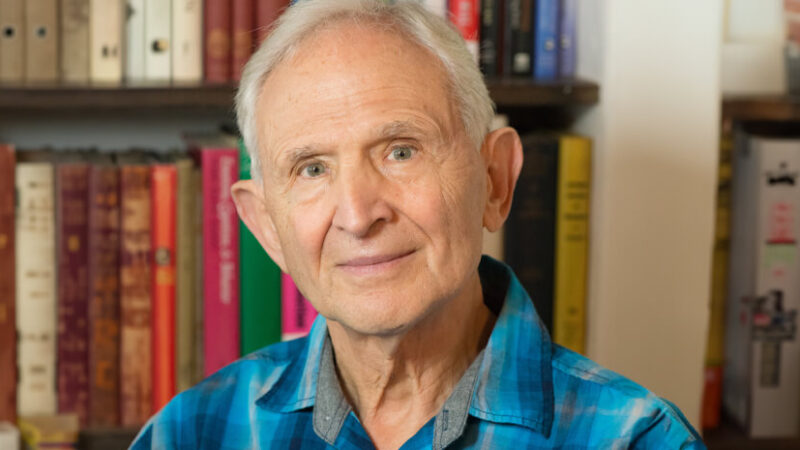-
E117: The Real Work: Letting Go from Within
Michael Singer — October 2, 2025
True spirituality isn’t about mystical experiences or lofty ideals—it’s about honestly facing...
-
Once More: Reflections on Reincarnation and the Gap Between Lives
Tami Simon — September 26, 2025
In this special reflection episode of Insights at the Edge host Tami Simon looks back on her...
-
Honey Tasting Meditation: Build Your Relationship with Sweetness
There is a saying that goes “hurt people hurt people.” I believe this to be true. We have been...
Written by:
Amy Burtaine, Michelle Cassandra Johnson
-
Many Voices, One Journey
The Sounds True Blog
Insights, reflections, and practices from Sounds True teachers, authors, staff, and more. Have a look—to find some inspiration and wisdom for uplifting your day.
Standing Together, and Stepping Up
Written By:
Tami Simon -
The Michael Singer Podcast
Your Highest Intention: Self-Realization
Michael Singer discusses intention—"perhaps the deepest thing we can talk about"—and the path to self-realization.
This Week:
E116: Doing the Best You Can: The Path to Liberation -
Many Voices, One Journey
The Sounds True Blog
Insights, reflections, and practices from Sounds True teachers, authors, staff, and more. Have a look—to find some inspiration and wisdom for uplifting your day.
Take Your Inner Child on Playdates
Written By:
Megan Sherer
600 Podcasts and Counting...
Subscribe to Insights at the Edge to hear all of Tami's interviews (transcripts available, too!), featuring Eckhart Tolle, Caroline Myss, Tara Brach, Jack Kornfield, Adyashanti, and many more.
Most Recent
4 Ways to Stay Healthy This Holiday Season

In the hustle and bustle of the holiday season, it can be difficult to keep your health in check. There are so many holiday parties, family gatherings and opportunities to overextend yourself. However, if you can follow these 4 simple tips, it will help you stay on track!
Hydrate
Drink plenty of water all day long. Choose water over sugary drinks and alcohol whenever possible. Keeping your body hydrated is a key ingredient in keeping your body balanced and in a state of homeostasis. Think of drinking water as bathing your cells in nourishment. If you’re at a party and everyone is drinking, just get a pretty glass and fill it with water and add a slice of lime or lemon. No one will know the difference.
Don’t Overeat
Only eat until you’re full. Did you know it takes 20 minutes for your belly to signal to your brain that you’re full? Eat slowly, mindfully and consciously, only choosing healthy options. You can treat yourself to dessert but try to keep the portion small and opt towards the healthier options.
Get Plenty of Sleep
Sleep is when your body rejuvenates and restores itself, so don’t skimp on rest during this fun (but often stressful) time of year. Keep electronics out of the bedroom and try to stay off screens for at least an hour before you go to bed. Instead, take a nice warm bath with bath salts and a drop of lavender oil. Read your favorite book or do a quiet meditation. Also, try not to eat 2-3 hours before bed.
Move Your Body
Exercise is another extremely important ingredient in staying healthy throughout the holiday season, as well as the rest of the year. Exercise brings oxygen to your cells and making you feel more awake and energized. If you can start your day with a yoga class (or even 20 minutes on your yoga mat in your home), it will set the tone for the day, helping you choose healthier options along the way. Even if all you can squeeze in is a short walk, you will feel so much better and less stressed.
Victoria Dodge is a cofounder of Yoga Salt, coauthor of The Yoga Plate, professional photographer, and cooking expert who has worked with companies such as Lululemon, Forbes, and Apple, as well as celebrity clients, models, and Hollywood figures like Shaquille O’Neal, James Cameron, and Sterling K. Brown. The Dodges live in North Carolina with their two children.

The community here at Sounds True wishes you a lovely holiday season! We are happy to collaborate with some of our Sounds True authors to offer you wisdom and practices as we move into this time together; please enjoy this blog series for your holiday season.
To help encourage you and your loved ones to explore new possibilities this holiday season, we’re offering 40% off nearly all of our programs, books, and courses sitewide. May you find the wisdom to light your way. Use promo code HOLIDAY10 and receive an additional 10% off your order.
3 Ways to Deepen Gratitude This Holiday Season
It is true that misery cannot simultaneously exist alongside gratitude and that, despite ourselves, we are constantly being given more than we give. To prove that point, try this simple, elegant practice and see for yourself. Please note: If you resist doing this exercise, consider that you are doing so because you, like most human beings, prefer to believe that you give more than you receive. If you find you’re wrong, what will happen to your resentment or other feelings of disappointment?
Naikan Inventory List
Take a few full size notebook paper and draw three columns. At the top of column #1, write “What he/she/they gave to me.” At the top of column #2, write “What I gave to him/her/them.” At the top of column #3, write “The trouble I caused him/her/them. Exhaust each column with your list of SPECIFIC items before moving onto the next. The timeline to consider is the last 3 months. The use of “always” or “usually” should be avoided. Be precise.
Write three letters of gratitude
You should have enough evidence to write three separate letters of appreciation to your partner. Be sure to make each different, using alternate words expressing thanks to your partner. You can give your partner this letter (or card), or you can simply keep it to yourself. Your choice. The exercise was for you anyway.
Write three letters of apology
You should have enough evidence from your list to apologize for putting your partner out. Make each letter unique by saying “I’m sorry” in different ways. Again, you can give this to your partner or simply keep it private. Either way, the exercise does its magic. If you were honest and thorough, you might have noticed that column #2 was shorter than columns 1 & 3. We are selfish creatures; always aware of what we’re not getting and how our partners cause us grief.
I hope this exercise has helped deepen your gratitude during this holiday season!
 Stan Tatkin, PsyD, MFT, is a clinician and author who integrates neuroscience, attachment theory, and current therapies. He directs training programs throughout North America and globally. He is the author of We Do: Saying Yes to a Relationship of Depth, True Connection, and Enduring Love, Wired for Love: How Understanding Your Partner’s Brain and Attachment Style Can Help You Defuse Conflict and Build a Secure Relationship.
Stan Tatkin, PsyD, MFT, is a clinician and author who integrates neuroscience, attachment theory, and current therapies. He directs training programs throughout North America and globally. He is the author of We Do: Saying Yes to a Relationship of Depth, True Connection, and Enduring Love, Wired for Love: How Understanding Your Partner’s Brain and Attachment Style Can Help You Defuse Conflict and Build a Secure Relationship.
The community here at Sounds True wishes you a lovely holiday season! We are happy to collaborate with some of our Sounds True authors to offer you wisdom and practices as we move into this time together; please enjoy this blog series for your holiday season.
To help encourage you and your loved ones to explore new possibilities this holiday season, we’re offering 40% off nearly all of our programs, books, and courses sitewide. May you find the wisdom to light your way.
3 Ways to Welcome the Sacred Feminine This Holiday Sea...

If you are anything like me (and almost everyone I encounter these days), you are growing bored with the patriarchy and eager to reclaim feminine wisdom across the spectrum of human community: politics, academia, pop culture, and religion and spirituality. It’s not a matter of personal preference. The well-being of our Mother the Earth is inextricably entwined with our choice to either lift up and center the feminine or continue to bury Her. Here are a few ways for you to welcome the sacred feminine this season.
Reclaim Mother Mary
With so much of the attention of the Western world focused on the legendary birth of a boy baby, we sometimes forget he had a badass mom. Mother Mary was anything but meek and mild. She was a powerful prophet, an unconditionally loving force, a broken-open heart on fire. She offered her divine YES (Hineyni, in Hebrew) and spoke truth to power with love. How can you soften and step up to the resounding call to be the instrument of peace you were born to be? Look to Mary as a guide.
Read Women’s Poetry
There are a host of truth-tellers in the form of contemporary women poets & they are brimming with mystical treasures. Back away from the news for a moment and pick up a poem. Read it three times. The first time, you are knocking on the door of the poem. The second time, the door opens. And the third time, you are invited all the way in. Here are some recommendations: Marie Howe; Ellen Bass; Lyla June; Hashem Beck; Lynn Unger; Naomi Shihab Nye; Jane Hirshfield; Linda Pastan; Mohja Kafh.
Cultivate a Sabbath Practice
The tyranny of tasks that bosses us around most of the year can intensify around the holidays. Even as the mystical traditions invite us to turn inward & rest in stillness during this season, the larger culture demands that we engage in an endless array of duties and expenditures. In the Jewish tradition, a weekly observance of Shabbat, infused with the Feminine Presence (the Shekinah), is not only a requirement of the faith, but the sweetest blessing. Find your way to keep the Sabbath holy.

Mirabai Starr writes creative non-fiction and contemporary translations of sacred literature. She taught Philosophy and World Religions at the University of New Mexico-Taos for 20 years and now teaches and speaks internationally on contemplative practice and inter-spiritual dialog. A certified bereavement counselor, Mirabai helps mourners harness the transformational power of loss. She has received critical acclaim for her revolutionary new translations of the mystics, John of the Cross, Teresa of Avila and Julian of Norwich. She is the award-winning author of GOD OF LOVE: A Guide to the Heart of Judaism, Christianity and Islam and CARAVAN OF NO DESPAIR: A Memoir of Loss and Transformation, and Mother of God Similar to Fire, a collaboration with iconographer, William Hart McNichols. Her latest book is Wild Mercy: Living the Fierce and Tender Wisdom of the Women Mystics. She lives with her extended family in the mountains of northern New Mexico.
The community here at Sounds True wishes you a lovely holiday season! We are happy to collaborate with some of our Sounds True authors to offer you wisdom and practices as we move into this time together; please enjoy this blog series for your holiday season.
To help encourage you and your loved ones to explore new possibilities this holiday season, we’re offering 40% off nearly all of our programs, books, and courses sitewide. May you find the wisdom to light your way. Use promo code HOLIDAY10 and receive an additional 10% off your order.
Customer Favorites
E43: Life as a Teacher: Lessons in Acceptance and Clar...
Acceptance and surrender are key spiritual principles that focus on embracing reality as it is and using it to let go of inner resistance and turmoil. Seen in this light, life’s challenges are not problems; they are opportunities for growth and spiritual evolution. For example, karma is not a punishment but a learning tool encouraging you to evolve consciously. By practicing acceptance and surrender, individuals can achieve clarity and respond to situations thoughtfully, which fosters great spiritual growth.
For more information, go to michaelsingerpodcast.com.
© Sounds True Inc. Episodes: © 2025 Michael A. Singer. All Rights Reserved.
Peter A. Levine: From Trauma to Awakening and Flow
After 50 years of helping thousands of clients in trauma recovery and now in his 80s, Peter A. Levine, PhD, continues the work of healing—both others and himself. In this podcast, Tami Simon speaks with the beloved Sounds True author and groundbreaking creator of the Somatic Experiencing® method about his personal journey and ongoing mission.
Give a listen to this inspiring conversation about the importance of community, the power of compassion, and the profound wisdom of the body, as Tami and Dr. Levine discuss: personal writing as a tool for working with trauma; self-compassion and kindness; conception trauma and procedural memories; the archetype of the wounded healer; the body as healer; how both trauma and wisdom are passed from generation to generation; conversations with Einstein; getting to the root of where you’re stuck; the promises and pitfalls of psychedelics; lessening our fear of dying; on-the-spot techniques for feeling safe in your nervous system; the ongoing nature of healing; the journey from trauma to awakening and flow; and more.
Note: This episode originally aired on Sounds True One, where these special episodes of Insights at the Edge are available to watch live on video and with exclusive access to Q&As with our guests. Learn more at join.soundstrue.com.
Rabbi Danya Ruttenberg: Mending the World with a Proph...
Every spiritual tradition teaches that we are all interconnected. Yet when we are faced with the world’s many injustices, we often want to turn away and isolate ourselves rather than feel the full measure of our grief, anger, and fear. In this podcast, Tami Simon speaks with Rabbi Danya Ruttenberg about how we can choose another path—one of openly encountering others with deep connection, accessing our prophetic voice to speak truth to power, and taking action while staying grounded in our spiritual selves.
Give a listen to this moving conversation exploring connecting to “the still, small voice” within yourself; Rabbi Nachman’s practice of the inner scream; allowing our bodies and hearts to process what we see in the world; our obligations as bystanders of harm; leaving your “spiritual bubble” to engage in real activism; speaking uncomfortable truths; the five steps involved in the work of repentance and repair; why the best spiritual practice is done in community; the practice of rest as a social justice issue; prayer, the work of the heart; and much more.





